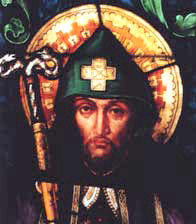|
|
Previous:
St. Martin of Tours November 11 St. Josaphat of PolotskNovember 12 1580-1643
1580-1643 Born in Lithuania (modern Ukraine) His father was a municipal counselor, and his mother known for her piety. Raised in the Orthodox Ruthenian Church which, on 23 November 1595 in the Union of Brest, united with the Church of Rome. Trained as a merchant's apprentice at Vilna, Lithuania, he was offered partnership in the business, and marriage to his partner's daughter; feeling the call to religious life, he declined both. Monk in the Ukrainian Order of Saint Basil (Basilians) in Vilna at age 20 in 1604, taking the name Brother Josaphat. Deacon. Ordained a Byzantine rite priest in 1609. Josaphat's superior, Samuel, never accepted unity with Rome, and looked for a way to fight against Roman Catholicism and the Uniats, the name given those who brought about and accepted the union of the Churches. Learning of Samuel's work, and fearing the physical and spiritual damage it could cause, Josaphat brought it to the attention of his superiors. The archbishop of Kiev, Ukraine, removed Samuel from his post, replacing him with Josaphat. He became a famous preacher. Worked to bring unity among the faithful, and bring strayed Christians back to the Church. Bishop of Vitebsk, Belarus. Most religious, fearing interference with the natively developed liturgy and customs, did not want union with Rome. Bishop Josaphat believed unity to be in the best interests of the Church, and by teaching, clerical reform, and personal example Josaphat won the greater part of the Orthodox in Lithuania to the union. Never completely suitable to either side, Roman authorities sometimes raised objection to Josaphat's Orthodox actions. Consecrated as Archbishop of Polotsk, Lithuania in 1617. While Josaphat attended the Diet of Warsaw in 1620, a dissident group, supported by Cossacks, set up an anti-Uniat bishops for each Uniat one, spread the accusation that Josaphat had "gone Latin," and that his followers would be forced to do the same, and placed a usurper on the archbishop's chair. Despite warnings, John went to Vitebsk, a hotbed of trouble, to try to correct the misunderstandings, and settle disturbances. The army remained loyal to the king, who remained loyal to the Union, and so the army tried to protect Josaphat and his clergy. Late in 1623 an anti-Uniat priest named Elias shouted insults at Josaphat from his own courtyard, and tried to force his way into the residence. When he was removed, a mob assembled and forced his release. Mob mentality took over, and they invaded the residence. Josaphat tried to insure the safety of his servants before fleeing himself, but did not get out in time, and was martyred by the mob. His death was a shock to both sides of the dispute, brought some sanity and a cooling off period to both sides of the conflict. "You people of Vitebsk want to put me to death. You make ambushes for me everywhere, in the streets, on the bridges, on the highways, and in the marketplace. I am here among you as a shepherd, and you ought to know that I would be happy to give my life for you. I am ready to die for the holy union, for the supremacy of Saint Peter, and of his successor the Supreme Pontiff." - Saint Josaphat View All Saints |




